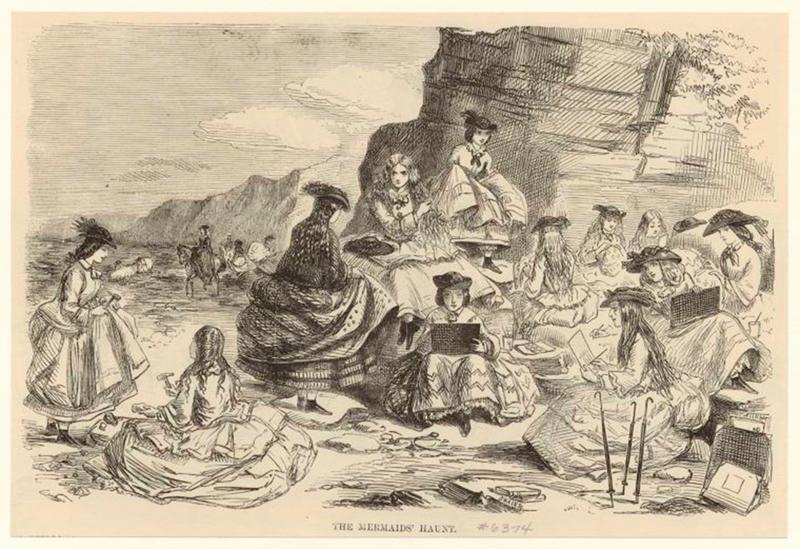SYMPOSIUM ‘Women Collectors of Natural History in Nineteenth-Century Britain’
Similar events

The Miriam and Ira D. Wallach Division of Art, Prints and Photographs: Picture Collection, The New York Public Library. John Leech, ‘The mermaids' haunt’. The New York Public Library Digital Collections. 1854 - 1869. https://digitalcollections.nypl.org/items/510d47e1-35a6-a3d9-e040-e00a18...
To attend this event, please register here.
In the course of the eighteenth and nineteenth centuries, the entry of women into the scientific world through natural history took place more or less discreetly, through popular science works, children’s literature or the artistic works they produced, all of which underline the role they played in the education, in particular science education, of young audiences. Their scientific contributions were also carried out by their collecting activities, both at home and abroad, as informal pastimes or as assistants – collecting for their husbands, brothers or fathers, or in some cases for professional agents and scientific museums. This symposium aims to re-examine the place of female collectors in the field of natural history in nineteenth-century Britain to define and reassess some of these women’s collections. The natural history collection will here be broadly conceived, from specimens preserved, classified and exhibited within the walls of scientific institutions to those kept in the private sphere. The museum and associated scientific societies became primary centres where knowledge of the natural world was developed and disseminated in the nineteenth century, but from which women were often partly or wholly excluded. Because many women’s collections have disappeared or been scattered due to lack of scientific recognition, they can often only be partially reconstructed through the very few archives that have kept a trace of these women’s work: letters, drawings, and diaries are so many pieces of evidence recording their contributions to science. As this symposium will show, it is, therefore, crucial to consider them to re-evaluate the boundaries of the museum and shed more light on the role played by women’s natural history collections in contributing to scientific knowledge in the long nineteenth century.
This symposium is part of a CNRS International Emerging Actions (IEA) research project (WOMNH–19; 2024–2025) conjointly led by Prof. Laurence Talairach (Alexandre-Koyré Centre/University Toulouse Jean Jaurès) and Associate Prof. Linda Andersson Burnett (Uppsala University, Sweden). WOMNH–19 aims to re-evaluate nineteenth-century British women’s contributions to natural history. By shedding more light on the place of women in some scientific fields, redefining lay and professional practices and foregrounding women’s contribution to the construction of scientific knowledge, WOMNH-19 seeks to understand better the construction of a scientific ‘culture’ and define its scholarly legitimacy. The 2024 symposium will be organised in collaboration with the Maison Française d’Oxford, the Oxford Museum of Natural History, the Alexandre-Koyré Center for the History of Science and Technology and the Department of History of Science and Ideas of Uppsala University.
Contact: laurence.talairach@univ-tlse2.fr & linda.andersson-burnett@idehist.uu.se
PROGRAMME
(Download the PDF here)
9.45: Welcome & Coffee
10.00–10.15: Introduction: Paul Smith (Director, O.U.M.N.H), Laurence Talairach & Linda Andersson-Burnett (IEA WOMNH-19)
10.15–10.45: Matthew Daniel Eddy (Durham University), ‘Our Geological Friend: Recovering the Legacy of Lady Charlotte Murchison’s Paleontological Collection’
10.45–11.15: Grace Exley (Leeds University/O.U.M.N.H.), ‘“You take the chisel & I the hammer”: Femininity, Fieldwork, and Geological Collections in the 19th Century’
11.15-11.45: Laurence Talairach (Alexandre-Koyré Center-MFO), ‘Seaweed Hunting and Victorian Women Algologists’
11.45–12.15: James T. Costa (Highlands Biological Station of Western Carolina University), ‘Gertrude Jekyll, Alice Eastwood, and British Horticultural History: The Wallace Connection’
12.15–13.00: Zoë Simmons (O.U.M.N.H.), Eliza Howlett (O.U.M.N.H.) & Danielle Czerkaszyn (O.U.M.N.H.), ‘Women Collectors & Collections at O.U.M.N.H.’
13.00–13.45: Lunch break
13.45–14.00: Linda Andersson Burnett (Uppsala University), ‘Women collectors and the University of Edinburgh’s Natural History Museum c. 1820-1850’
14.00–14.30: Audrey Walshe (University of Galway), ‘The Colonial Legacy of the Work and Collections of Lady Edith Blake’
14.30–15.00: June Watson (Northumbria University), ‘Lady Emma Tankerville (1752-1836): The Quest to Classify Natural History Specimens of Madeira 1810-1812’
15.00–15.30: Coffee break
15.30–16.00: Anna Svensson (Uppsala University), ‘The Mirror of Memories: Nostalgia, Emotion and Place in the Gendered Herbarium’
16.00–16.30: Kate Hill (University of Lincoln), ‘Exhibits of Living Creatures’: Women, Natural History and Collecting Live Specimens in Britain, 1880-1914’
16.30–17.00: Concluding remarks & future events: Pascal Marty (Director, Maison Française d’Oxford), Laurence Talairach & Linda Andersson-Burnett (IEA WOMNH-19)



